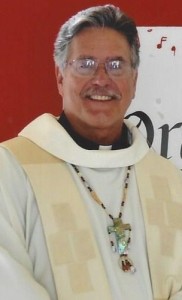from your Pastors Desk
“Thinking Thomas” – No Doubt.
There is something to be said for doubt at times. It is a good thing to be able to doubt oneself, provided it doesn’t become an addiction that cripples us; to doubt one’s ideas, one’s principles, one’s work…. And to doubt much of what we hear.
Although religion can provide emotionally unstable people with a vast canvas for their illusions, and a platform for the arrogant and the power-hungry…. It is healthy and essential to be able to doubt many things. It is a proof that your life is not on automatic pilot, that you have not finished thinking and weighing things up.
Doubt is not always the opposite of faith; the real opposite of faith is a certain kind of fear. Fear makes you curl up and do nothing, or it makes you run away. Faith pushes you to risk yourself, to pit yourself against difficulties.
Thomas was a careful man, but he was not a fearful one. He was capable of fearless action: “Let us go to Jerusalem and die with him,” he said (John 11:16). It is not that Thomas lacked faith; it is simply that he was not going to be fooled.
He wanted to “see the mark of the nails made in his hands and put my finger into the nail marks they made….” He wanted to experience it for himself. The same evangelist John, who told this story about Thomas’ doubts, once wrote, “…what we have heard, what we have seen with our own eyes, what we have watched and touched with our hands…concerns the Word of Life” (1 John 1:1).
Why should Thomas be blamed for wanting the same kind of experiential knowledge that John says he himself and the other disciples had? There is no blame to Thomas for wanting to experience the reality for himself. Isn’t it what every disciple of Jesus has to do?
Thomas was also a thinking man; he always wanted to understand and figure things out. Once when Jesus was speaking obscurely about going away and he said, “You know the way to where I am going,” Thomas cut in and said, “Lord, we don’t know where you are going, so how can we know the way?” It was a practical man’s question, and you can imagine the puzzled look on his face. It was puzzlement, not doubt. He didn’t doubt Jesus or lack trust in him.
Why (in today’s reading) was he missing from the group when Jesus appeared? I think it likely he had gone away by himself to think. It would be entirely in character. We dishonor him when we call him ‘Doubting Thomas’. We should call him ‘Thinking Thomas’. There is no area of life more subject to delusion than religion. We have to thank Thomas for his distinctive combination of carefulness and courage.
Of this I have no doubts – I think.
Father Ron

